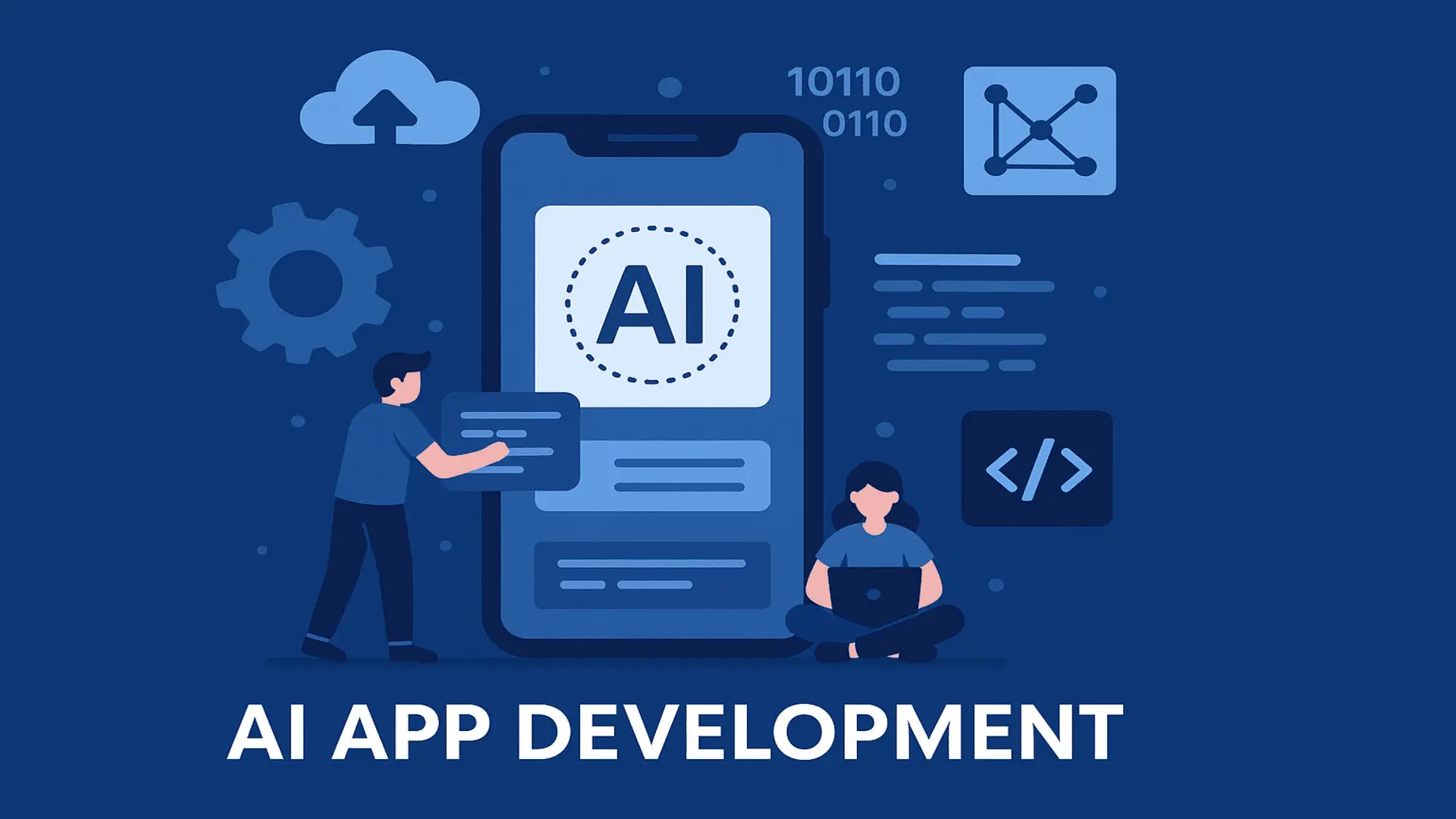7 ways AI is Transforming Mobile App Development in 2025

In the last decade, the world of mobile app development has grown fantastically.
As the use of mobile phones continues to grow, so businesses and developers are focusing increasingly on developing applications that provide frictionless, intelligent user experiences. Enter Artificial Intelligence, more famously known as AI, the technology that is changing industries and the way in which we use mobile applications.
Where integration is expected to have increased manifold by 2025, AI is expected to be more than an intrinsic part of mobile application development; it could also mean a whole redefinition of user experience and development processes.
In this blog, we will be discussing the importance of AI in developing mobile applications. The discussion will pertain to its benefits and features and how AI is reshaping the future of mobile application development.
What is Mobile Application Development?
Mobile app development is the creation of software application programs that function on cellular devices, such as smartphones and tablets. In creating these applications, developers use a variety of programming languages, systems, and equipment to design, build, and finally solve a user problem, enhance productivity, or entertain.
During the last couple of years, the mindset of mobile application development has shifted from mere deliverability to a more personalized, intuitive, and immersive experience for consumers. Be it Android application development or cross-platform mobile application development; organizations plan to make their applications more engaging, appealing, and user-friendly.
What is AI?
AI, or Artificial Intelligence, is the intelligence of machines that perform tasks that would typically require human intelligence. This includes but is not limited to processes such as problem-solving, learning, speech recognition, decision-making, and more.
In mobile app development, AI technologies like machine learning, natural language processing, and computer vision are integrated into applications, making them much more intelligent, user-friendly, and with the ability to serve users effectively.
From automated recommendations down to the recognition of images and voice instructions, AI turns any mobile app into a smart assistant that is able to provide a hyper-personalized user experience.
How Artificial Intelligence (AI) Is Revolutionizing Mobile App Development
AI in mobile application development changes the approach towards the development of applications. It embeds intelligent systems in them that can learn and adjust to the users’ needs, enabling applications beyond functionality. Here’s how AI is revolutionizing mobile app development:
Custom AI Software Development Solution For Enterprises
Ai-Powered Features Enhancing User Experience
Mobile applications are no longer purely functional tools but have turned out to be interactive and responsive companions that try to anticipate user needs. AI provides many features that remarkably enhance user experience and make apps more intuitive and user-friendly.
- Recommendations for Personalized Content
The AI-driven recommendation engine at Amazon generates 35% of the company’s revenue, according to a McKinsey report.
With AI, it can go the extra length by analyzing user behavior, preferences, and habits to offer the most personalized content recommendation. Popular applications- Netflix and Spotify- are using AI algorithms to recommend specific content based on previous interactions and user ratings.
Equally, developers of mobile apps will increasingly use AI to make personalized recommendations in shopping, fitness, and news apps that drive higher levels of user engagement and retention.
- Voice Assistants and Conversational AI
Voice assistants, for instance, Apple’s Siri, Google Assistant, and Amazon Alexa remain a staple in mobile devices. With advancements in AI technology, the precision of voice assistants is growing to manage complicated requests.
Also, conversational AI finds its place in mobile applications, where users could be in a position to interact using chatbots with the apps or give voice commands; this would be easy and fast.
AI in Improvement of Mobile Application Security
The security aspect, with more and more personal data kept on mobile apps, is not something to be trifled with. AI can significantly enhance the security of applications by incorporating intelligent threat detection, real-time fraud detection, and enhanced authentication techniques for the security of devices and personal information.
AI-powered algorithms can sift through user behavior patterns to detect unusual patterns and flag them for action, helping developers avoid data breaches and cyber-attacks.
Examples of such techniques include AI-based face detection, fingerprint scanning, and behavior-based authentication which are already making the security features available in the apps more robust and user-friendly.
Predictive Analytics with AI-enabled Mobile Applications
AI-powered predictive analytics enable mobile applications to predict user needs and behavior. Patterns may also be identified with the analysis of historical data, through which AI will study and forecast the actions that may occur in the future. This way, apps will give recommendations and push notifications relevant to users at the right time, boost their engagement, and provide better satisfaction to the users.
For instance, eCommerce apps use AI to predict what products a user is likely to buy, based on previous browsing and buying history, to improve the customer’s shopping experience and hopefully increase sales.
AI and Chatbots for Improved Customer Support
AI-powered chatbots are going to revolutionize customer support in mobile applications. These will be able to engage users in real-time, answer frequently asked questions, help them troubleshoot, and even solve problems without any need for human interference.
As AI chatbots continue to evolve in complexity, they can offer faster, more effective support, saving wait times and enhancing customer satisfaction.
AI in Augmented Reality (AR) and Virtual Reality (VR) for Mobile Apps
Applications serve as the demand for both AR and VR, especially in retail, gaming, education, and health industries. Artificial Intelligence is essential in making those above-mentioned technologies even more realistic and user-friendly.
It means, for example, AI algorithms can enhance the accuracy and interactivity of augmented reality features in apps like IKEA’s AR application, where users virtually set furniture in their homes. In game applications, AI is used in the development of smart characters and dynamic environments to enrich the experience of the player.
Artificial Intelligence for Optimizing App Development Process
AI is transforming how developers approach user-facing features and the app development process itself. Mobile application developers now use AI to automate basic tasks like coding, testing, and debugging. This automation frees up resources, allowing developers to focus on higher-order aspects of the development process.
Utilizing AI-powered development platforms can help hasten the construction and testing of apps to cut down their time-to-market and increase the quality of the end products.
Moreover, AI analytics tools help developers monitor end-user feedback and the performance of the apps themselves, making informed decisions possible during development and long after post-launch updates.
Challenges in AI App Development
Although a lot has been said about how AI will benefit mobile application development, a fair number of challenges developers face in attempting to incorporate AI into their apps still exist. These are:
- High Development Costs: AI can be quite expensive to integrate into an app; this is very true for small and medium-scale businesses.
- Data Privacy: Most AI systems perform well when they have large datasets. This again creates concerns regarding data privacy and security of users.
- Complexity: Since AI-based applications require special knowledge along with resources, the development process is much more challenging compared to traditional app development.
- Ethical Issues: Bias, fairness, and accountability in AI systems will be a growing concern for ethics as AI plays a major role in decision-making.
In 2025, AI will become an increasingly major player in the field of mobile app development. AI makes the experience much more personalized while increasing app security, improving customer support, and optimizing the whole process of development. Yet, with increasing inclusions of AI in the development and functioning of mobile applications, affordability, data privacy, and ethics raise more concerns.
While mobile application developers are trying to test the boundaries of innovation, AI is definitely going to be at the core of driving the future of mobile application platforms.
With a bright future in front of the mobile application development landscape, embracing AI technologies will be a key for businesses and developers looking to outsmart the competition. Understanding the power and potential of AI helps a business build smarter, intuitive mobile apps that will answer user needs in 2025 and beyond.









